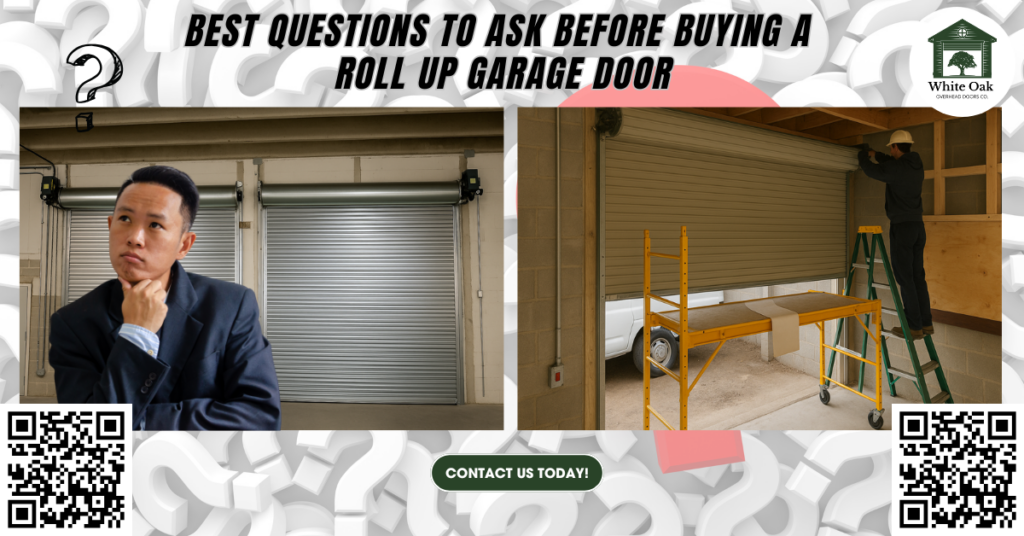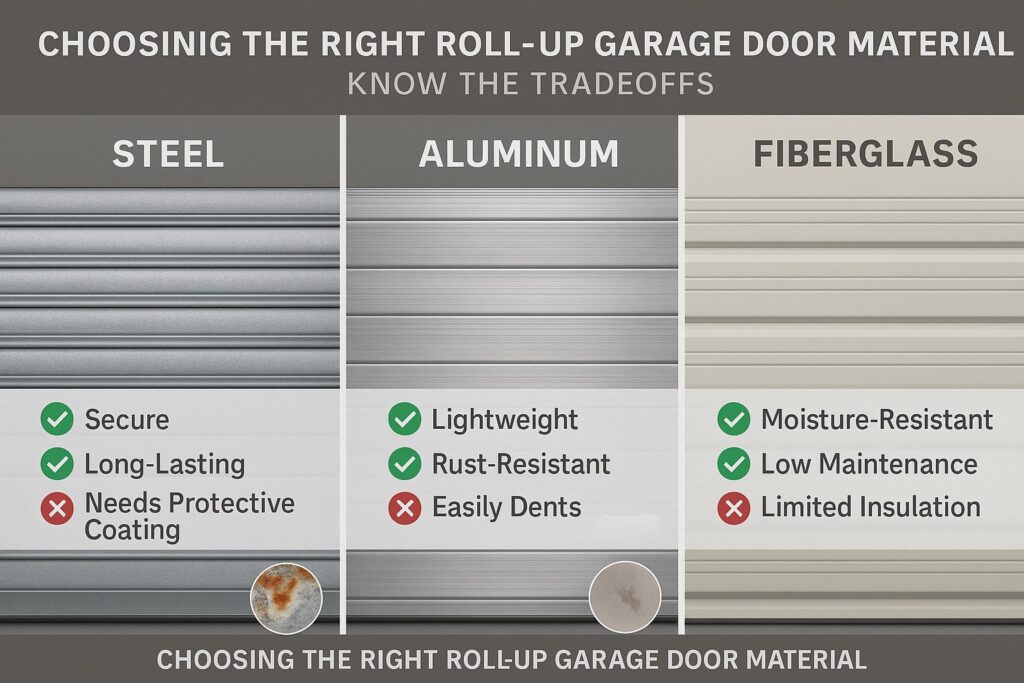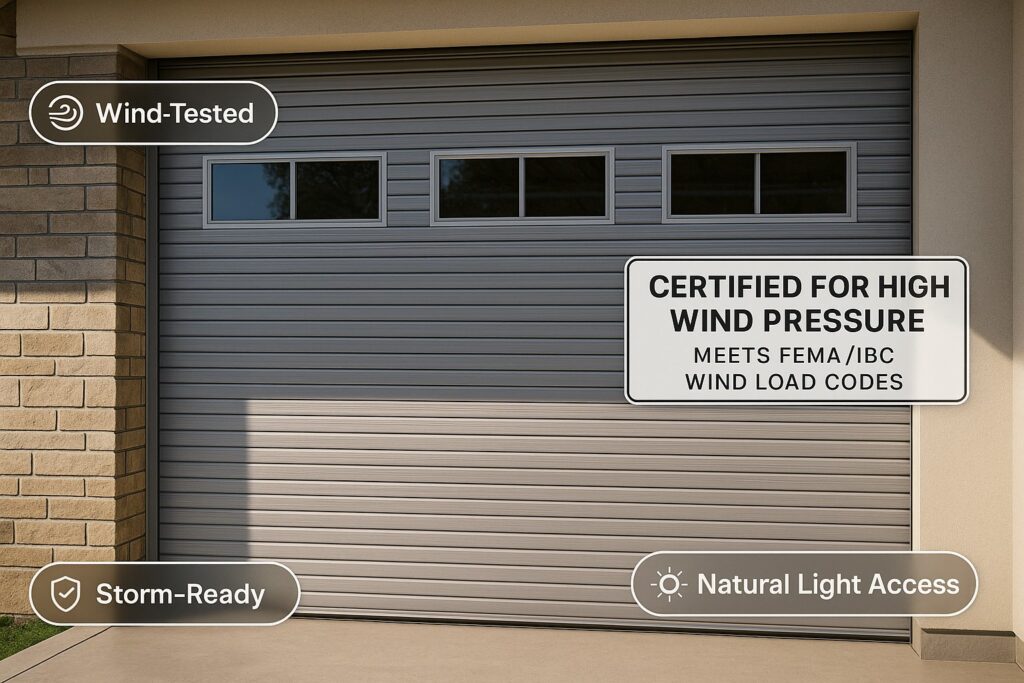Best Questions to Ask Before Buying a Roll- Up Garage Door

When a family in The Heights called White Oak Overhead Doors Co., they were struggling with a common problem: their garage was too hot in the summer and too cold in the winter. They had a beautiful home, but their old, non-insulated roll-up door let in heat, cold, and even noise from the busy street. After replacing it with an insulated garage door, their energy bills dropped, the garage felt more comfortable, and they were finally able to use the space as a home gym.
Did you know that up to 30% of your home’s energy loss can happen through your garage door, especially if it’s not properly insulated? That’s why choosing the right roll-up garage door is more than just picking one that looks good, it’s about performance, comfort, and savings. Whether you’re a homeowner or a business owner in Houston, asking the right questions before buying a garage door can make a big difference.
At White Oak Overhead Doors Co., we specialize in helping people just like you find the perfect door for their home, business, or garage space. Here’s a complete guide to the best questions to ask before buying a roll-up garage door, and what to consider to make the best investment for your property.
1. What Type of Material Is Best for My Roll Up Garage Door?
Garage doors come in many materials, and each one has its benefits and downsides. Some common types include:
- Steel: Strong, durable, and long-lasting. It’s great for high-security needs and can handle bad weather like Houston’s heavy rainstorms.
- Aluminum: Lighter than steel and doesn’t rust, but can dent more easily. It’s perfect for modern homes or areas near the coast.
- Fiberglass: Resistant to moisture and won’t warp or crack. Not as common, but useful in hot, humid climates.

Before choosing, ask:
- Do I want strength (steel) or lightweight material (aluminum)?
- Do I need rust resistance or dent resistance?
2. Should I Choose an Insulated Garage Door?
If you want to lower your energy bills, reduce noise, and protect your home from temperature swings, then yes, an insulated garage door is worth it. Insulated garage doors can turn your garage into a more usable space while keeping it warm in winter and cool in summer.
Common insulation types include:
- Polyurethane: High-density foam with a high R-value, meaning better insulation.
- Polystyrene: More affordable but slightly lower R-value.
- Batt insulation or rigid foam panels: Can be added with a DIY insulation kit.
Ask:
- What’s the R-value of this door?
- What type of insulation material is used?
- Will this help reduce noise and heat transfer?
3. What Is the R-Value and U-Value?
- R-value tells you how well the garage door resists heat flow. A higher R-value = better insulation. For Houston’s hot summers, an R-value of 12 or higher is ideal.
- U-value is the opposite; it shows how much heat is transferred. A lower U-value = better energy savings.
Be sure to ask:
- What is the R-value of this garage door?
- How does this help improve energy efficiency?
4. Is This Garage Door Energy-Efficient?
Energy-efficient garage doors are built with insulation materials like urethane foam or Styrofoam and often include weather sealing. This can cut down your cooling and heating costs and increase the value of your home.
Ask:
- Is this door energy-efficient?
- Will it help reduce my energy bills?
5. What Are the Pros and Cons of This Garage Door?
Every door has its pros and cons. Here’s a simple breakdown:
Door Type | Pros | Cons |
Steel | Durable, secure, energy-efficient | Can rust if coating is damaged |
Aluminum | Lightweight, rust-resistant | Prone to dents |
Insulated | Energy savings, noise reduction | Higher initial cost |
Non-insulated | Lower price | Poor temperature and noise control |
Ask:
- What are the pros and cons of this specific door type?
- Is there a step-by-step guide for maintenance?
6. What Garage Door Opener Works Best With This Door?
Not all garage door openers work with every roll-up door. Some heavier doors need stronger openers. Look for openers from trusted brands like Chamberlain or Craftsman that match your door’s weight and size.
Ask:
- Will my current opener work with this door?
- Should I upgrade to a smart opener with a logic board?
7. What Design and Style Options Are Available?
Roll-up garage doors don’t have to be boring. You can choose from:
- Panel styles (flush, raised, ribbed)
- Colors to match your home or business
- Window inserts for natural light
- Decorative hardware for curb appeal
Ask:
- Can I customize the design?
- Are there insulated doors that still look stylish?
8. How Much Will This Door Cost?
Cost depends on the size, material, insulation, and extra features. Insulated doors with high R-values cost more upfront but save money long-term through energy savings and fewer repairs.
Ask:
- What’s the total cost, including installation?
- Are there financing or payment plan options?
- Will it increase my return on investment?
9. Is This Door Good for Houston’s Weather?
Houston weather can be extreme—hot summers, sudden rain, and even storms. Your door should be able to handle:
- Heat insulation for hot weather
- Weather sealing to prevent rain leaks
Thermal transfer control for temperature changes

Ask:
- Is this door weather-rated?
- Will it help prevent heat loss or heat gain?
10. Can This Door Help Reduce Noise?
Insulated roll-up doors reduce noise from the street or driveway, which is perfect for homes in busy neighborhoods. This is especially helpful if you use your garage as a:
- Home office
- Workshop
- Game room or gym
Ask:
- How well does this door block outside noise?
- Does it have noise reduction features?
11. How Long Will This Garage Door Last?
A good roll-up garage door can last 15 to 30 years with proper maintenance. Insulated doors tend to last longer due to added structure and weather resistance.
Ask:
- What’s the expected lifespan?
- What kind of warranty is included?
12. Can I Install the Door Myself?
While DIY garage door kits are available, installing a roll-up door is complex and potentially dangerous due to tension springs and heavy panels. It’s best to hire professionals.
Ask:
- Is professional installation included?
- Will old doors be removed?
13. What Brands Are Available?
At White Oak Overhead Doors Co., we work with top brands like:
- Amarr Garage Doors
- Martin Garage Doors
- Clopay Garage Doors
Ask:
- What brand is this door from?
- Are parts and services easy to get?
14. Can This Door Fit My Unique Garage Space?
Not all garages are the same. Some have unusual sizes or low ceilings. Roll-up doors are space-saving and work well in small or narrow garages.
Ask:
- Can this door be customized for my space?
- What are my door type options?
How Can White Oak Overhead Doors Co. Help You?
At White Oak Overhead Doors Co., we’re here to make your garage door buying experience easy, affordable, and stress-free. Our expert technicians will help you choose the best roll-up garage door for your needs, whether you want to improve energy efficiency, add insulation, or just upgrade your home’s style.
From start to finish, we’ll handle:
- Free estimates and consultations
- Custom fitting and measurements
- Professional installation
- Repairs, maintenance, and upgrades
We serve Houston, TX, and nearby communities with pride and quality service.
📍 Visit us at 1440 Studemont St, Houston, TX 77007
📞 Call us today at (832) 990-1595 to schedule your free consultation and discover the right garage door for your home or business.
Let White Oak Overhead Doors Co. help you open the door to comfort, style, and energy savings.
Frequently Asked Questions (FAQs)
1. How long does it take to install a roll-up garage door?
Most professional installations take 4 to 6 hours, but custom or oversized doors may require more time.
2. Are roll-up garage doors secure against break-ins?
Yes, they are designed with tight tracks and locking mechanisms that make them harder to pry open compared to traditional doors.
3. Can roll-up garage doors be automated later?
Absolutely, manual roll-up doors can be upgraded with a compatible garage door opener for automated use.
4. What’s the difference between single-skin and double-skin roll-up doors?
Single-skin doors have one layer of metal, while double-skin doors include an insulation layer between two panels for better temperature and sound control.
